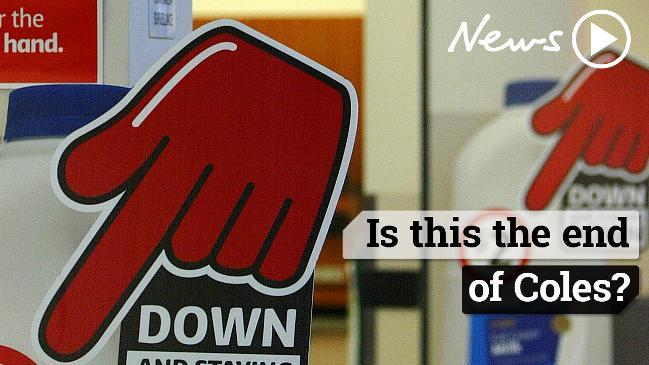Coles carved off: Uncertain future of supermarket giant
COLES supermarkets dominate Australian suburbs. But the retail giant’s hold on the market is shaky, and it’s ripe for a takeover.

NEXT time you’re in Coles, take a moment. Look around. Nothing lasts forever and one day, memories of this Australian supermarket chain might be all we have.
The future of Coles has never been more uncertain. Coles is being kicked out of home in November and will be forced to survive on its own. Wesfarmers — Coles’ corporate parent — has decided it likes its other children more.
Bunnings and Kmart seem to have much better prospects than Coles supermarkets, which was once the jewel in the company’s crown. So Wesfarmers decided to carve off the supermarket and turn it into a separate company (while retaining a 15 per cent stake). They confirmed on Wednesday this will happen in November.
When you look at Coles’ recent performance, it becomes clear why the shine has come off the golden child. As this next chart shows, profit has been falling sharply in recent years as price competition has become intense.

Coles is just not the powerful force it was. Its weight in the market has been stagnating for a while and has fallen sharply in the last couple of years. Costco and Aldi are stealing its customers. Its revenues are a shrinking chunk of the Australian economy, as this next graph shows.

Re-establishing that relevance is only going to get harder. The time of Coles and Woolworths dominating food retailing is over, with price competition intensifying.
“I only see competition increasing in the supermarket sector,” said Wesfarmers CEO Rob Scott on Wednesday. “There’s new entrants coming into the market over the next couple of year who are hard discounters. We’ve seen global entrants already this year and pricing that is pretty sharp in that space.”
HOW THIS PLAYS OUT
Without the heft of Wesfarmers to back them, what will become of Coles? Is this another Myer story? Can we expect a slow fade out with rolling store closures until the company is haunted by the risk of going into administration? You can’t rule something like that out. Retail has always been hard and right now it is harder than ever.
MORE: Coles expansion to convenience stores might be bad news for IGA
MORE: Coles Little Shop swap descends into chaos
Of course, Coles might thrive on its own. Maybe Wesfarmers was holding it back. It might suddenly feel free to innovate, beat back the foreign invaders, and eventually dominate. (Personally, if I owned Coles I would set up a supermarket sub-brand that emulated Aldi as exactly as possible, and get it going ASAP, before Lidl arrives on our shores.)
Another likely story is that Coles becomes a lone lamb stumbling in the wilderness, and is picked off by a predator. Nobody wanted to buy it a little while ago when its value was estimated by one investment bank at $18 billion. But if its share price falls after it is spun off, it could start to seem like good value.
Also, Wesfarmers is retaining a 15 per cent stake in Coles.

A foreign acquisition becomes even simpler if the Australian dollar falls in the next few years, making Australian assets look cheap to the foreign companies and investment firms who are sitting on big piles of cash.
At the end of a long period of low global interest rates, cash is abundant and acquisitions are easy to do. The Lowy family sold off their Westfield assets to a French conglomerate for $32 billion last year, for example.
SUPERMARKET BRANDS DON’T LAST FOREVER
John Connell Dickins and Company once had 54 supermarkets across Melbourne and Victoria. But then, in 1958, Coles bought up John Connell Dickins stores, and the name disappeared. It is not the only supermarket brand to vanish. It happens all the time.
For example, some of my earliest memories are being in a Payless supermarket in Melbourne. That brand has vanished without a trace, just like Safeway (which itself engulfed a brand called Pratts, before being absorbed by Woolworths). Bi-Lo and Franklins have gone the same way.
What Coles did to John Connell Dickins, a much larger retailer can do to Coles.

WHO MIGHT BE INTERESTED IN COLES?
The list of big supermarkets that could decide to have a crack at Australia is long, and it could surprise us. (Who expected Kaufland to show up here, for example?)
It might be Walmart. Sainsbury’s. Trader Joe’s (owned by the same family that owns Aldi.) Carrefour. Or someone you’ve never heard of.
Or it could be Amazon. They have shown willingness to buy grocery assets. In 2017, Amazon bought Whole Foods, a US supermarket chain, at a price of $US14 billion ($AU19.4 billion).
That bought 479 stores. If it could buy Coles’ 800 stores for less, it might just do that.
What does Coles have that foreign buyers might want? Location, location, location. As Aldi has discovered, the hardest thing in food retail is finding big spaces in urban areas. Coles has 800 large stores in terrific locations. A company like Walmart could buy the lot, rebrand a few to see how its business model goes and take it from there. If we like what we see, that could be the end for the Coles brand.
News.com.au contacted Coles and Wesfarmers, but they declined to comment.
Jason Murphy is an economist. He writes the blog Thomas the Think Engine.




